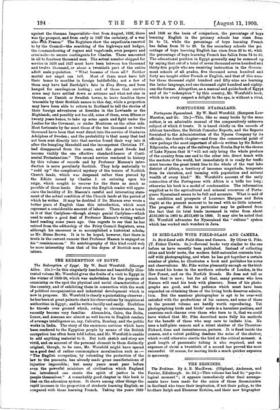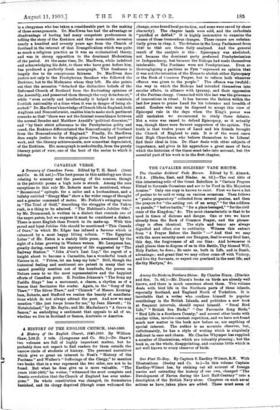THE ERSKINES.
The Erskine& By A. R. llilacE wen. (Oliphant, Anderson, and Ferrier, Edinburgh. 28. 6d.)—This volume has had its "psycho- logical moment" ; it appears immediately after final arrange- ments have been made for the union of those Secessionists in Scotland who trace their inspiration, if not their policy, to the brothers Ralph and Ebenezer Erskine, and their new biographer
is a clergyman who has taken a considerable part in the making of these arrangements. Dr. MacEwen has had the advantage or disadvantage of haying had many competent predecessors in telling the story of the Erskines and their memorable secession nearly a hundred and seventy years ago from the Church of Scotland in the interest of that Evangelicalism which was quite as much a religious practice as it was an ecclesiastical theory, and was in strong opposition to the dominant Moderatism of the period. At the same time, Dr. MacEwen, while indebted and acknowledging his debt, to those who have gone before him, has -produced a perfectly fresh monograph. This freshness is largely due to its conspicuous fairness. Dr. MacEwen does justice not only to the Presbyterian Seceders who followed the Erskines, but to the Moderates whom they left. He also points out that the secession "detached the distinctive beliefs of the Reformed Church of Scotland from the fluctuating opinions of the Assembly, and preserved them through the very detachment," while "even socially and intellectually it helped to maintain Ccottish nationality at a time when it was in danger of being ab- sorbed." Dr. MacE wen's knowledge of Church life in England, both Anglican and Nonconformist, enables him to make such pertinent remarks as that "there was not the faintest resemblance between the normal Seceder and Matthew Arnold's 'political dissenter," and "by their strict adherence to the Presbyterian polity and creed, the Erskines differentiated the Nonconformity of Scotland from the Nonconformity of England." Finally, Dr. MacEwen does ample justice to the simple, pious lives, the hard pastoral work, and the literary achievements, now somewhat depreciated, of the Erskines. His monograph is undoubtedly, from the purely literary point of view, one of the best of the series to which it belongs.



































 Previous page
Previous page